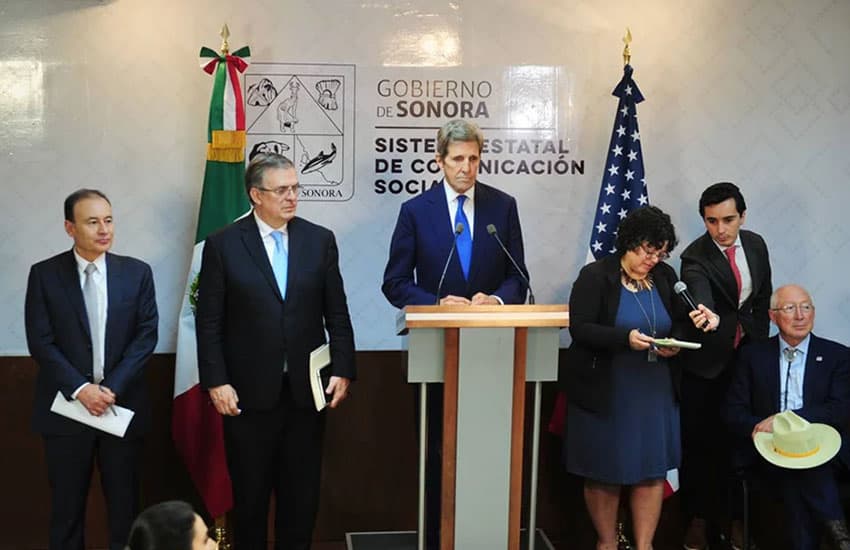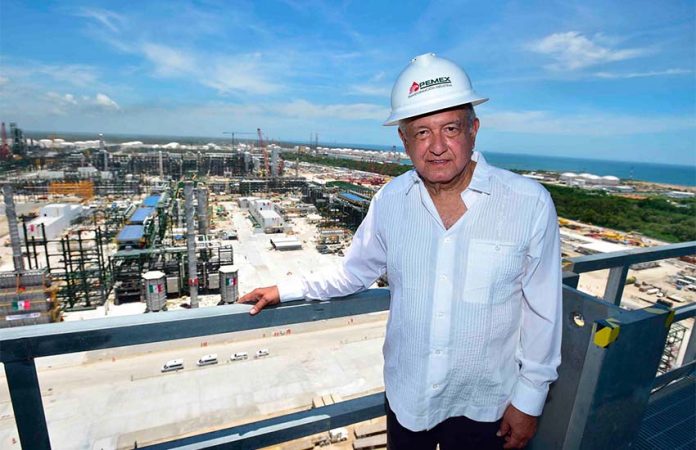Mexico will increase its greenhouse gas emission reduction targets at the United Nations Climate Change Conference currently underway in Egypt, the federal Environment Ministry (Semarnat) said Tuesday.
Semarnat said in a statement that Mexico – Latin America’s second largest greenhouse gas emitter after Brazil – would commit to reducing its emissions by 30% by 2030 “with its own resources.”
The country’s current national determined contribution goal, unchanged since 2016, is to cut emissions by 22% by the final year of this decade.
Semarnat also said that Mexico would lift its conditional emission reduction target to 40% from 36%. Meeting that goal is dependent on external support.

Environment Minister María Luisa Albores González outlined the new commitments Mexico is set to make in a message broadcast online on Tuesday. She said that the Environment Ministry has identified more than 40 measures across all economic sectors to cut emissions.
According to the Semarnat statement, they include “solutions based in nature” including the planting of trees and the creation of more natural protected areas, increasing the use of zero-emissions vehicles, promoting rail transport and remote working and increasing regulation of industry.
The measures – which were also presented during a meeting between President López Obrador and U.S. climate envoy John Kerry in late October – will allow “an estimated total annual reduction” of 88.9 million tonnes of carbon dioxide equivalent by 2030, Semarnat said.
The ministry said that Agustín Ávila Romero, head of the National Institute of Ecology and Climate Change, and Miguel Ángel Zerón, chief of Semarnat’s International Affairs Unit, will attend the U.N. climate conference in Egypt, commonly referred to as COP27.

The Institute of the Americas, an independent, inter-American organization that promotes public-private cooperation across the Americas, noted in a report late last year that Mexico would need to implement additional policies to meet its 2030 target of reducing its greenhouse gas emissions by 22%.
“Mexico’s rollback of support to renewable energy and its response to the pandemic has put the country’s emissions on an upward path. … Emissions will ramp up again as the economy recovers,” the institute said, noting also that Mexico’s was the world’s 12th largest greenhouse gas emitter.
“… The government is now favoring fossil fuels with the construction of a new refinery; a new budget allocation for the modernization of coal, diesel, gas and oil-fueled power plants; and the cancellation of long-term power auctions,” it said.
“Lastly, a recent energy bill effectively halting private renewable energy investments prioritizes the government’s own aging fossil-fuel plants. This reform could force changes in the electricity dispatch order that would significantly increase CO2 emissions.”

At an energy and climate forum hosted by U.S. President Joe Biden earlier this year, López Obrador – an energy nationalist and fossil fuel champion – presented 10 “actions” Mexico is “implementing in the fight against climate change.”
Among the actions he cited were the modernization of 16 hydroelectric plants; Pemex’s investment of US $2 billion to reduce its methane gas emissions by up to 98%; the construction of a 1,000-megawatt solar farm in Puerto Peñasco, Sonora; and the planting of fruit and timber-yielding trees on 1 million hectares of land by means of the Sembrando Vida (Sowing Life) employment/reforestation program.
But Mexico – which was criticized by the Climate Action Network at COP26 in Scotland last year “for pumping more, not less, money into the fossil fuel industry” – is still not seriously committed to tackling climate change, according to some experts.
“It’s highly likely that the Mexican government will try to deceive the entire world at COP27 with false actions and projects that will never be built,” Carlos Flores, a renewable energy expert, told the newspaper The Guardian. “We are not going to meet our current pledges, never mind anything more ambitious,” he said.
“There is no way to look positively at the climate action of an administration that has been focused on undermining renewable energy. In order for Mexico to meet its Paris objectives, we will need a new president in 2024 who can regain the trust of investors and has a real commitment to the environment,” Flores added.
Adrián Fernández, executive director of the activist organization Iniciativa Climática de México (Mexico Climate Initiative), said that energy policy that helps rather than hinders the renewable sector is needed to enable Mexico to achieve its climate commitments.
With reports from Reuters, La Jornada, The Guardian and El Economista
